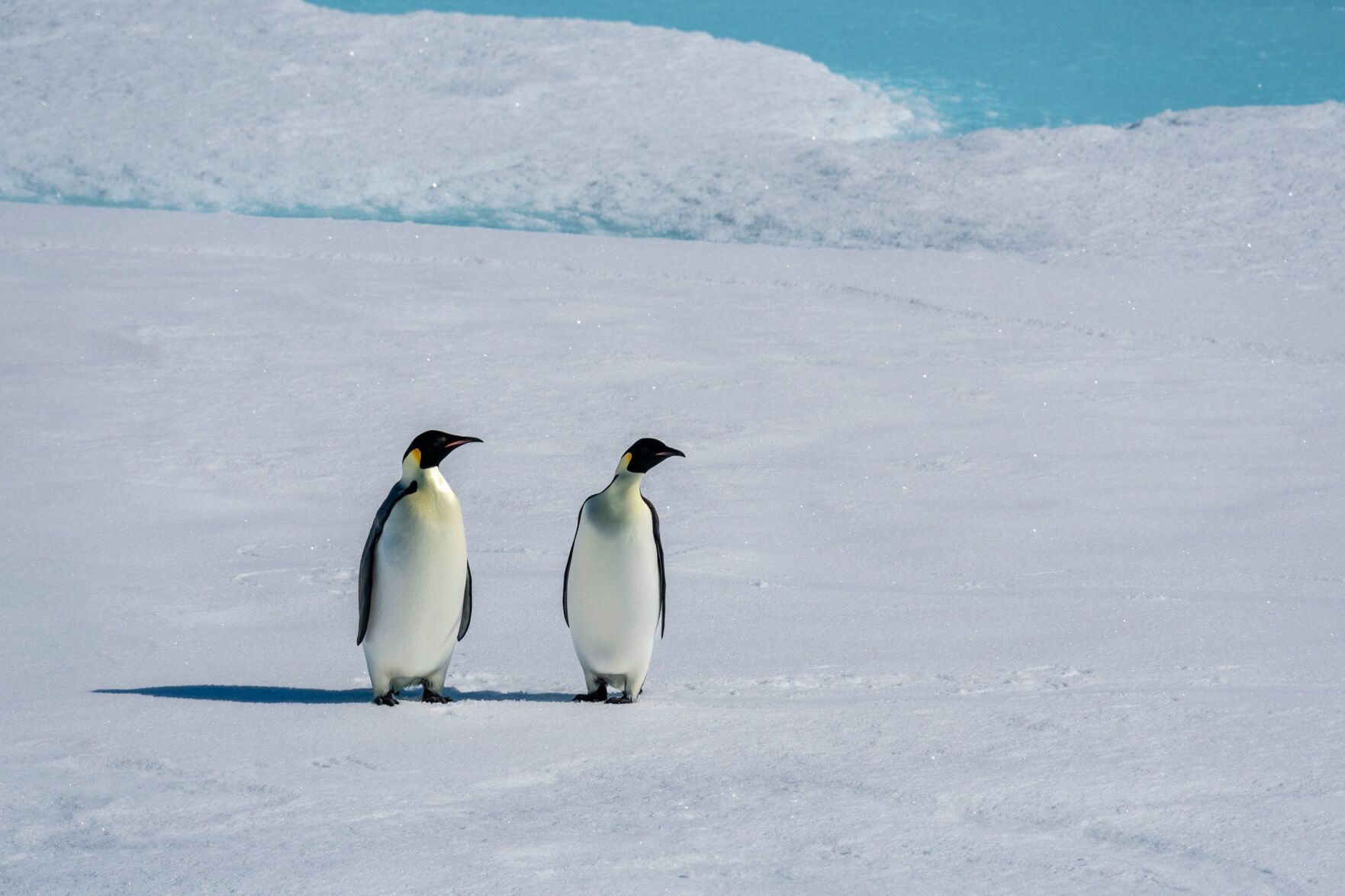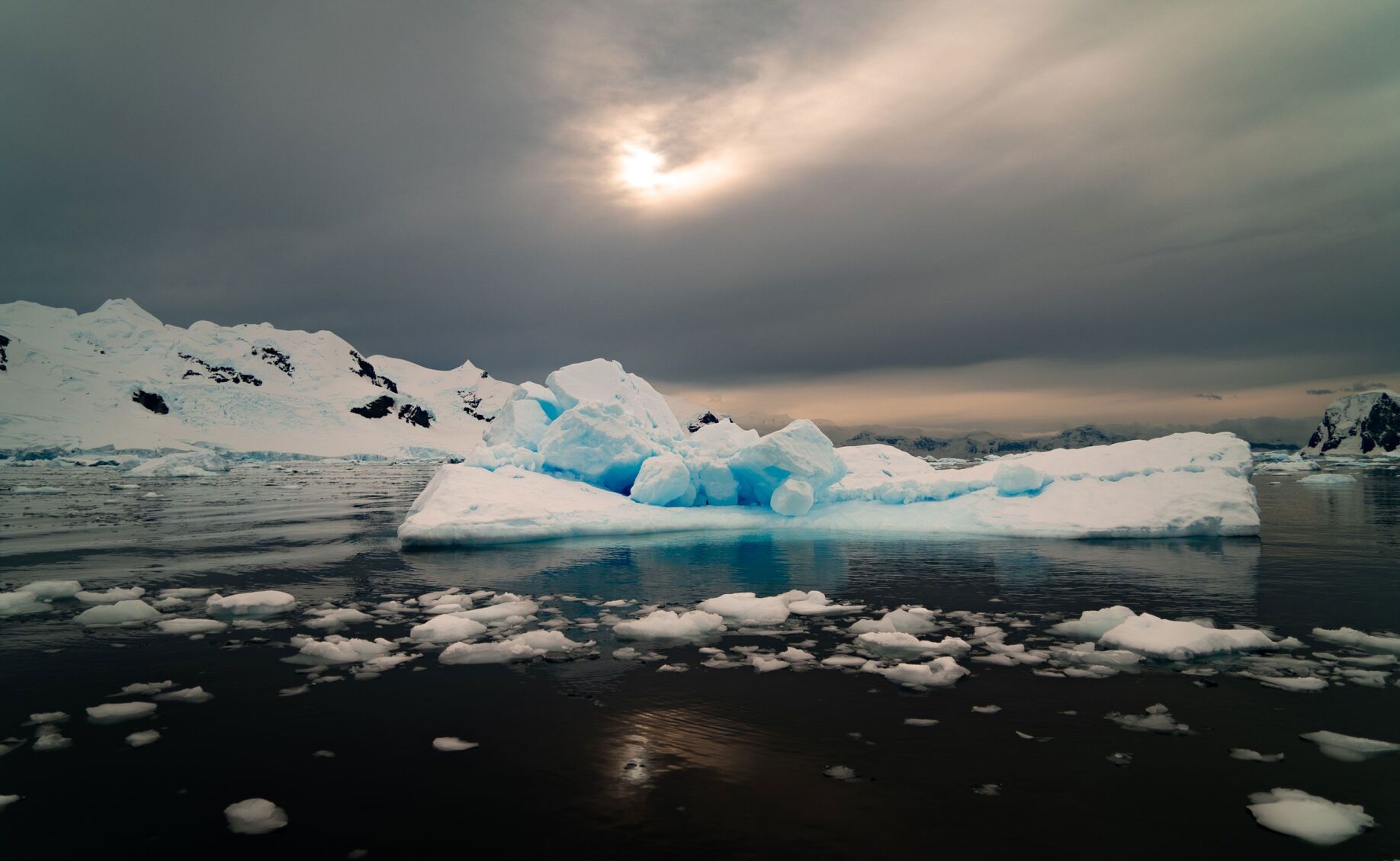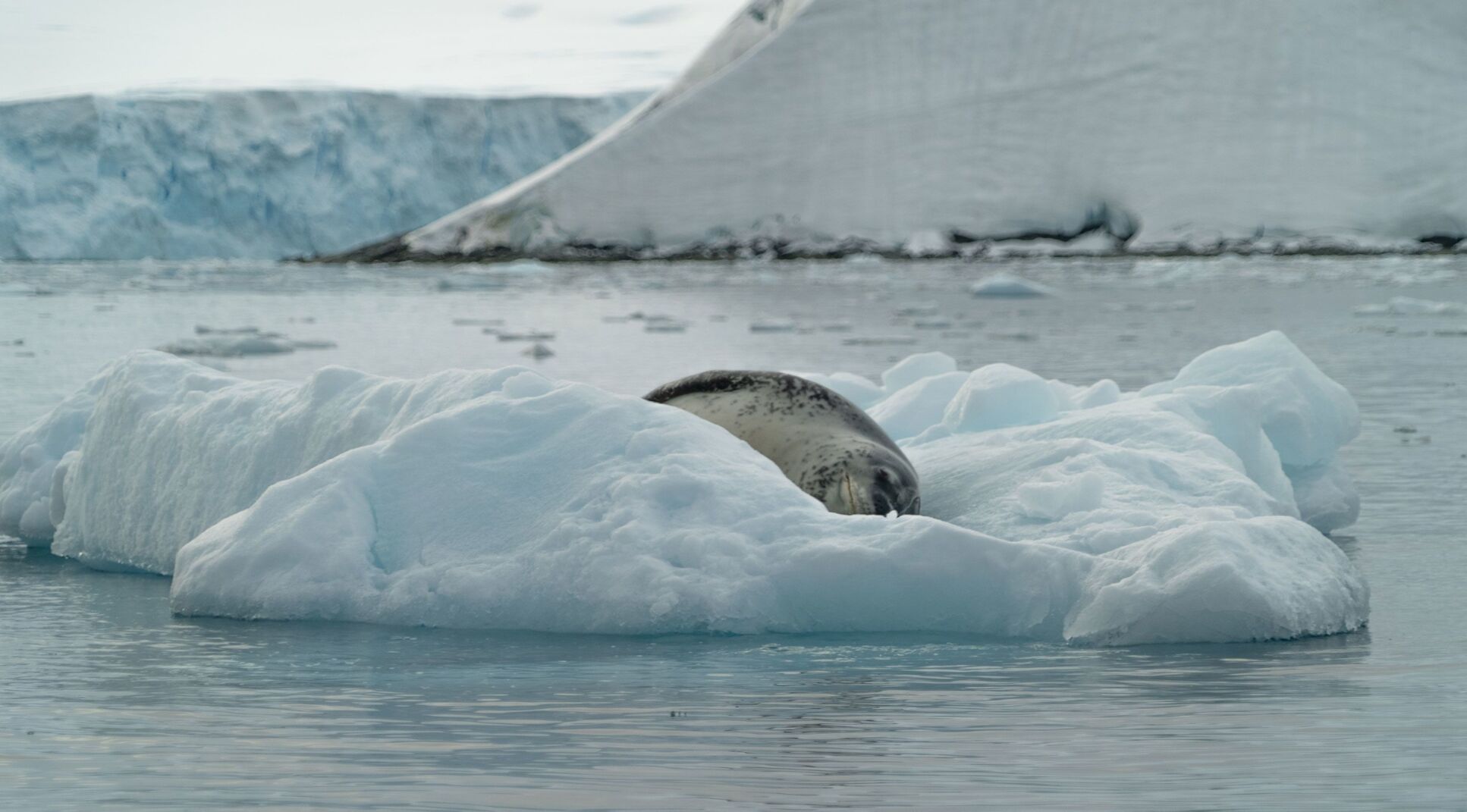As rapidly warming global temperatures help push Antarctica’s sea ice to unprecedented lows, it’s threatening the very existence of one of the continent’s most iconic species: emperor penguins.
Four out of five emperor penguin colonies analyzed in the Bellingshausen Sea, west of the Antarctic Peninsula, saw no chicks survive last year as the area experienced an enormous loss of sea ice, according to a new study published Thursday in the journal Nature Communications Earth & Environment.
This widespread “catastrophic breeding failure” is the first such recorded incident, according to the report, and supports grim predictions that more than 90% of emperor penguin colonies will be “quasi-extinct” by 2100 as the world warms.

Sergio Pitamitz/VWPics/AP
Emperor penguin (Aptenodytes forsteri) pair on sea ice, Larsen B Ice Shelf, Weddell Sea, Antarctica.
The researchers monitored five emperor penguin colonies in the Bellinghausen Sea, ranging in size from roughly 630 pairs to 3,500. Using satellite images from 2018 to 2022, they counted how many of the birds were present at these colonies during breeding season.
They found that in 2022, four of the colonies experienced “total reproductive failure,” meaning it is highly probable that no chicks survived.
Emperor penguins rely on stable sea ice attached to land for nesting and raising their chicks. Eggs are laid from May to June and after they hatch, the chicks develop their waterproof feathers and become independent around December and January.
But in 2022, the sea ice broke up much earlier, with the some parts of the region seeing a total loss by November. Researchers monitoring the satellite images said they were used to seeing black blobs on ice during that time of the year, but suddenly there were none.
When the sea ice breaks earlier, chicks can fall into the water and drown, said Norman Ratcliffe, co-author of the study and seabird biologist with the British Antarctic Survey. “Or they may drift away on floes and the adults just lose them and then they would starve to death,” he told CNN.

Julian Quinones/CNN
An iceberg drifts off the Antarctic Peninsula in March.
The penguins in this region have experienced “a massive loss,” said Ratcliffe, calling the findings “an early alarm bell.” Previously, these sorts of breeding failures “have been very much dispersed and at a lower incidence across the continent,” he said.
For the past few years, scientists have been sounding the alarm about a steep decline in Antarctica’s sea ice.
It fell to unprecedented lows in February, at the height of the continent’s summer. Even in the depths of winter, when the ice usually builds back, it still did not return to anywhere near expected levels. In mid-July, Antarctic sea ice reached the lowest level for this time of year since records began in 1945. It was 2.6 million square kilometers (1 million square miles) below the 1981 to 2010 average – an area as large as Argentina.
Scientists are still trying to untangle the reasons why, but many believe the human-caused climate crisis is a major driver.
For emperor penguins, this downward trend is especially devastating, said Ratcliffe, because “there’s nowhere else for the birds to go.” The birds are known to adapt to breeding failures by relocating to other nearby sites, but that won’t work if the entire breeding habitat is affected.
Between 2018 and 2022, 30% of the 62 known emperor penguin colonies in Antarctica were affected by partial or total sea ice loss, according to the report.
Cassandra Brooks, an assistant professor at the University of Colorado Boulder who has done extensive research on Antarctic species and who was not involved in the research, said that the study provides even more proof that emperor penguins face risks to their survival.
“There is mounting evidence that emperor penguins may actually go extinct directly due to loss of sea ice resulting from our planet’s warming,” she told CNN. “Our window in which to ensure their survival is narrowing.”

Julian Quinones/CNN
A leopard seal takes an afternoon nap on a small iceberg in March.
A separate study published last year found that 65% of Antarctica’s native species, emperor penguins top among them, will likely disappear by the end of the century if the world fails to rein in planet-warming fossil fuel pollution. In the worst-case scenario, it found emperor penguins could be completely wiped out by 2100.
The disappearance of sea ice won’t just affect the penguins. It puts other species at risk, including seals, which rely on sea ice to feed and rest, as well as the microorganisms and algae that feed the krill which, in turn, are vital to the diets of many of the region’s whales.
Antarctic sea ice also helps regulate the planet’s temperature, reflecting the sun’s incoming energy back to space. When the ice melts, it exposes the darker ocean beneath which absorbs the sun’s energy and contributes to global warming.
“The bottom line is that this is quite concerning both for the physical oceanography and biology of Antarctica and the ecosystems that depend on them,” Ratcliffe said.
___
-
Zoos hiding birds as avian flu spreads in North America
A Gentoo penguin feeds its chick at Station Bernardo O'Higgins in Antarctica on Jan. 22, 2015. (AP Photo/Natacha Pisarenko)
A Gentoo penguin feeds its chick at Station Bernardo O'Higgins in Antarctica on Jan. 22, 2015. (AP Photo/Natacha Pisarenko)
-
Zoos hiding birds as avian flu spreads in North America
Seen through glass, a penguin looks out of the water in a pool in the zoo of Frankfurt, Germany, on Jan. 27, 2012. (AP Photo/Michael Probst)
Seen through glass, a penguin looks out of the water in a pool in the zoo of Frankfurt, Germany, on Jan. 27, 2012. (AP Photo/Michael Probst)
-
-
Zoos hiding birds as avian flu spreads in North America
African penguins gather to keep warm as others are fed sardines by staff at the South African Foundation for the Conservation of Coastal Birds after they were found covered in oil on Robben Island, Cape Town, South Africa, on Sept 20, 2012. Some 200 penguins were found covered in oil following a spillage by a stricken bulk carrier. (AP Photo/Schalk van Zuydam)
African penguins gather to keep warm as others are fed sardines by staff at the South African Foundation for the Conservation of Coastal Birds after they were found covered in oil on Robben Island, Cape Town, South Africa, on Sept 20, 2012. Some 200 penguins were found covered in oil following a spillage by a stricken bulk carrier. (AP Photo/Schalk van Zuydam)
-
Zoos hiding birds as avian flu spreads in North America
In this Jan. 20, 2015 photo, a Chinstrap penguin stands on the coast near the town of Villa Las Estrellas on King George Island in Antarctica. (AP Photo/Natacha Pisarenko)
In this Jan. 20, 2015 photo, a Chinstrap penguin stands on the coast near the town of Villa Las Estrellas on King George Island in Antarctica. (AP Photo/Natacha Pisarenko)
-
-
Zoos hiding birds as avian flu spreads in North America
Natacha Pisarenko
In this Jan. 27, 2015, photo, penguins walk on the shore of Bahia Almirantazgo in Antarctica. (AP Photo/Natacha Pisarenko)
Natacha Pisarenko
In this Jan. 27, 2015, photo, penguins walk on the shore of Bahia Almirantazgo in Antarctica. (AP Photo/Natacha Pisarenko)
-
Zoos hiding birds as avian flu spreads in North America
Penguins play soccer at the Hakkeijima Sea Paradise aquarium-amusement park complex in Yokohama, Japan, May 23, 2010. (AP Photo/Itsuo Inouye)
Penguins play soccer at the Hakkeijima Sea Paradise aquarium-amusement park complex in Yokohama, Japan, May 23, 2010. (AP Photo/Itsuo Inouye)
-
-
Zoos hiding birds as avian flu spreads in North America
Penguins dive into the water as an aquarium employee cleans the penguin habitat in Tokyo, July 23, 2007. (AP Photo/David Guttenfelder)
Penguins dive into the water as an aquarium employee cleans the penguin habitat in Tokyo, July 23, 2007. (AP Photo/David Guttenfelder)
-
Zoos hiding birds as avian flu spreads in North America
A woman directs penguins as they are released on the outskirts of Blouberg, South Africa, May 21, 2009. The Southern African Foundation for the Conservation of Coastal Birds released 84 African penguins back into the wild after they were treated for oil pollution that they obtained in Namibia. (AP Photo/Schalk van Zuydam)
A woman directs penguins as they are released on the outskirts of Blouberg, South Africa, May 21, 2009. The Southern African Foundation for the Conservation of Coastal Birds released 84 African penguins back into the wild after they were treated for oil pollution that they obtained in Namibia. (AP Photo/Schalk van Zuydam)
-
-
Zoos hiding birds as avian flu spreads in North America
Rockhopper penguins, usually living in sub-Antarctic islands, are seen in their enclosure as they ignore a zookeeper, not seen, holding fish to attract them in order to scan them in London Zoo, June 1, 2010. The photo opportunity was organized to mark the process of the annual scanning of the birds, which have been microchipped. (AP Photo/Lefteris Pitarakis)
Rockhopper penguins, usually living in sub-Antarctic islands, are seen in their enclosure as they ignore a zookeeper, not seen, holding fish to attract them in order to scan them in London Zoo, June 1, 2010. The photo opportunity was organized to mark the process of the annual scanning of the birds, which have been microchipped. (AP Photo/Lefteris Pitarakis)
-
Zoos hiding birds as avian flu spreads in North America
Dudley Wigdahl, a curator of marine mammals and birds, feeds a rescued Magellanic penguin at the Aquarium of the Pacific in Long Beach, Calif., April 7, 2011. Five Magellanic penguins arrived at the aquarium after they were rescued after being found stranded off a beach in Brazil. (AP Photo/Jae C. Hong)
Dudley Wigdahl, a curator of marine mammals and birds, feeds a rescued Magellanic penguin at the Aquarium of the Pacific in Long Beach, Calif., April 7, 2011. Five Magellanic penguins arrived at the aquarium after they were rescued after being found stranded off a beach in Brazil. (AP Photo/Jae C. Hong)
-
-
Zoos hiding birds as avian flu spreads in North America
Dudley Wigdahl, a curator of marine mammals and birds, looks at rescued Magellanic penguins at the Aquarium of the Pacific in Long Beach, Calif., April 7, 2011. The penguins were rescued after being found stranded off a beach in Brazil. (AP Photo/Jae C. Hong)
Dudley Wigdahl, a curator of marine mammals and birds, looks at rescued Magellanic penguins at the Aquarium of the Pacific in Long Beach, Calif., April 7, 2011. The penguins were rescued after being found stranded off a beach in Brazil. (AP Photo/Jae C. Hong)
-
Zoos hiding birds as avian flu spreads in North America
Veterinary nurse Sarah Papageorgiou cares for an Antarctic penguin that wound up stranded on a New Zealand beach and resorted to eating sand at Wellington Zoo in Wellington, New Zealand, June 27, 2011. (AP Photo/New Zealand Herald, Mark Mitchell)
Veterinary nurse Sarah Papageorgiou cares for an Antarctic penguin that wound up stranded on a New Zealand beach and resorted to eating sand at Wellington Zoo in Wellington, New Zealand, June 27, 2011. (AP Photo/New Zealand Herald, Mark Mitchell)
-
-
Zoos hiding birds as avian flu spreads in North America
A Rockhopper penguin swims beneath a colony of penguins at the Shedd Aquarium in Chicago, April 11, 2007. (AP Photo/Charles Rex Arbogast)
A Rockhopper penguin swims beneath a colony of penguins at the Shedd Aquarium in Chicago, April 11, 2007. (AP Photo/Charles Rex Arbogast)
-
Zoos hiding birds as avian flu spreads in North America
Pierre the Penguin, 25, wears his wetsuit at the Academy of Sciences in San Francisco, April 17, 2008. Pierre, who was going bald, began wearing a wetsuit and began growing back his feathers. (AP Photo/Eric Risberg)
Pierre the Penguin, 25, wears his wetsuit at the Academy of Sciences in San Francisco, April 17, 2008. Pierre, who was going bald, began wearing a wetsuit and began growing back his feathers. (AP Photo/Eric Risberg)
-
-
Zoos hiding birds as avian flu spreads in North America
Kyoto, a three-week-old king penguin, nestles up to a toy penguin in the nursery at the Cincinnati Zoo, Aug. 21, 2008. The toy plush penguin was placed with Kyoto to simulate a parent. The baby penguin, taken from its parents and placed in the zoo's nursery as standard procedure, was re-introduced to his family when his down feathers came in. (AP Photo/Al Behrman)
Kyoto, a three-week-old king penguin, nestles up to a toy penguin in the nursery at the Cincinnati Zoo, Aug. 21, 2008. The toy plush penguin was placed with Kyoto to simulate a parent. The baby penguin, taken from its parents and placed in the zoo's nursery as standard procedure, was re-introduced to his family when his down feathers came in. (AP Photo/Al Behrman)
-
Zoos hiding birds as avian flu spreads in North America
Humboldt penguins enter the water area of their new habitat for the first time, April 7, 2009, at the Woodland Park Zoo in Seattle. (AP Photo/Ted S. Warren)
Humboldt penguins enter the water area of their new habitat for the first time, April 7, 2009, at the Woodland Park Zoo in Seattle. (AP Photo/Ted S. Warren)
-
-
Zoos hiding birds as avian flu spreads in North America
Steven Sarro, right, the director of animal programs at the National Aviary in Pittsburgh, looks over the African penguin colony in the birds' new exhibit, May 27, 2009. (AP Photo/Keith Srakocic)
Steven Sarro, right, the director of animal programs at the National Aviary in Pittsburgh, looks over the African penguin colony in the birds' new exhibit, May 27, 2009. (AP Photo/Keith Srakocic)
-
Zoos hiding birds as avian flu spreads in North America
Mark Mitchell
In this photo taken June 21, 2011, a woman photographs an Emperor penguin lying on Peka Peka Beach along the Kapiti Coast in New Zealand. (AP Photo/New Zealand Herald, Mark Mitchell)
Mark Mitchell
In this photo taken June 21, 2011, a woman photographs an Emperor penguin lying on Peka Peka Beach along the Kapiti Coast in New Zealand. (AP Photo/New Zealand Herald, Mark Mitchell)
-
-
Zoos hiding birds as avian flu spreads in North America
A penguin chick whose oil-encrusted feathers have been cleaned recovers in the South African Foundation for the Conservation of Coastal Birds after being rescued from Robben Island in Cape Town, South Africa, Sept. 3, 2012. (AP Photo/Schalk van Zuydam)
A penguin chick whose oil-encrusted feathers have been cleaned recovers in the South African Foundation for the Conservation of Coastal Birds after being rescued from Robben Island in Cape Town, South Africa, Sept. 3, 2012. (AP Photo/Schalk van Zuydam)
-
Zoos hiding birds as avian flu spreads in North America
In this Jan. 22, 2015, photo, a Gentoo penguin regurgitates food to feed its chick near Chile's station Bernardo O'Higgins, Antarctica. (AP Photo/Natacha Pisarenko)
In this Jan. 22, 2015, photo, a Gentoo penguin regurgitates food to feed its chick near Chile's station Bernardo O'Higgins, Antarctica. (AP Photo/Natacha Pisarenko)
-
-
Zoos hiding birds as avian flu spreads in North America
A women watches penguins swimming at Taman Safari in Bogor, West Java, Indonesia, Nov. 19, 2008. (AP Photo/Achmad Ibrahim)
A women watches penguins swimming at Taman Safari in Bogor, West Java, Indonesia, Nov. 19, 2008. (AP Photo/Achmad Ibrahim)
-
Zoos hiding birds as avian flu spreads in North America
In this undated file photo, a lonely penguin appears in Antarctica during the southern hemisphere's summer season. (AP Photo/Rodrigo Jana)
In this undated file photo, a lonely penguin appears in Antarctica during the southern hemisphere's summer season. (AP Photo/Rodrigo Jana)
-
-
Zoos hiding birds as avian flu spreads in North America
In this June 30, 2000, file photo, an oil-stained penguin is seen in the water on Dassen Island near Cape Town, South Africa. (AP Photo /Obed Zilwa, File)
In this June 30, 2000, file photo, an oil-stained penguin is seen in the water on Dassen Island near Cape Town, South Africa. (AP Photo /Obed Zilwa, File)
-
Zoos hiding birds as avian flu spreads in North America
A rescued Magellanic penguin shakes water off at the Aquarium of the Pacific in Long Beach, Calif., April 7, 2011. (AP Photo/Jae C. Hong)
A rescued Magellanic penguin shakes water off at the Aquarium of the Pacific in Long Beach, Calif., April 7, 2011. (AP Photo/Jae C. Hong)
-
-
Zoos hiding birds as avian flu spreads in North America
Rescued Magellanic penguins are seen at the Aquarium of the Pacific in Long Beach, Calif., April 7, 2011. (AP Photo/Jae C. Hong)
Rescued Magellanic penguins are seen at the Aquarium of the Pacific in Long Beach, Calif., April 7, 2011. (AP Photo/Jae C. Hong)



